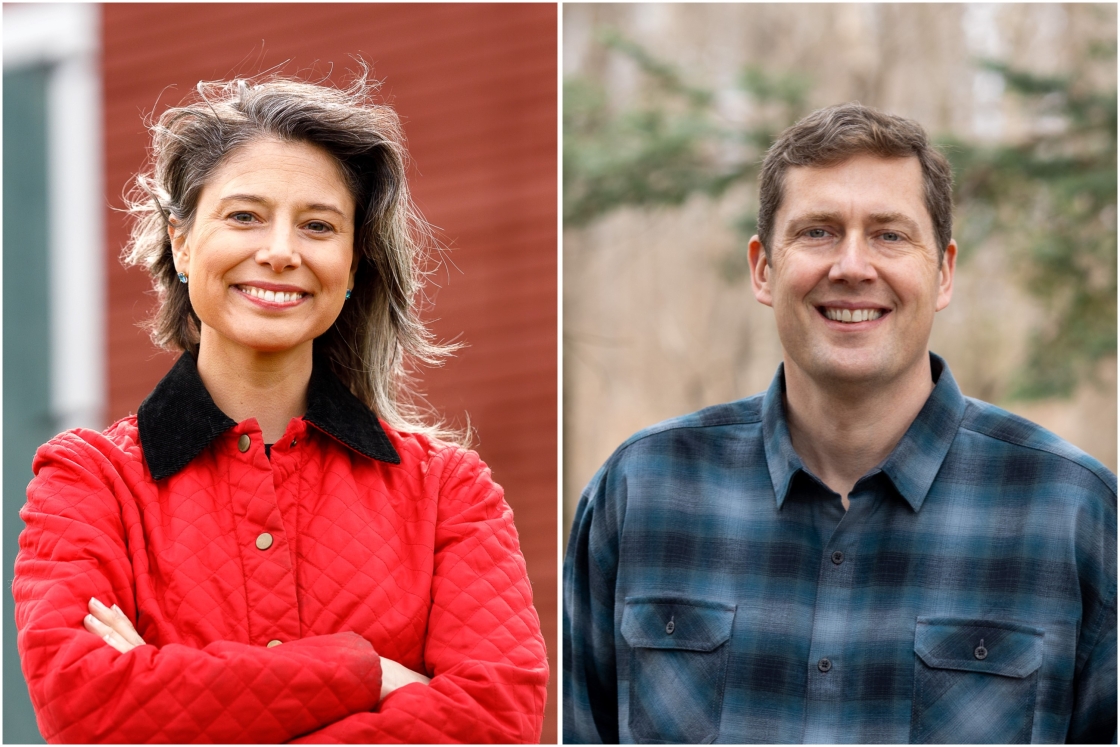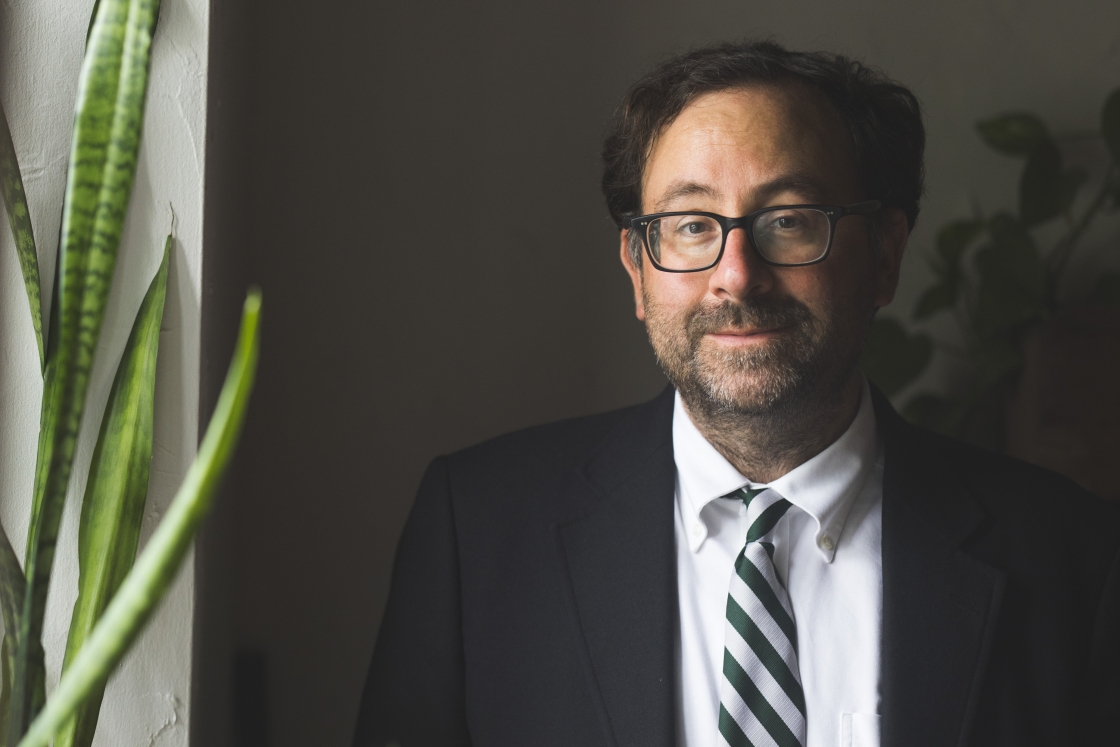A woman walks alone onto the stage in the Moore Theater at the Hopkins Center for the Arts wearing a long skirt, a flowered shawl, and a black hijab.
Rohina Malik, a London-born playwright, actress, and activist who lives and works in Chicago, performs scenes from her play Unveiled at Spaulding Auditorium Jan. 18. (Photo by Robert Gill)
The traditional headscarf fully covers her hair, framing an expressive face. Perched on a straight-backed chair beside a table set for tea, she tells five compelling stories about deepening rifts between Muslims and non-Muslims. For each vignette, she takes on the character of a different Muslim woman. The avatars live in different places and come from contrasting social backgrounds, yet all find their lives disrupted, sometimes dangerously, by backlash after the terrorist attacks of Sept. 11, 2001.
This is not a typical keynote address for Dartmouth’s annual Martin Luther King Jr. celebration. It is a solo performance by Rohina Malik, a London-born playwright, actress, and activist who lives and works in Chicago. Malik first brought excerpts of her play, Unveiled, to Dartmouth last spring during Islam Awareness week. Evelynn Ellis, vice president for Institutional Diversity and Equity and co-chair of this year’s King events, wanted to bring her back.
“But at the time I had no idea where we would be right now in the discussion of Muslims in this country,” Ellis said.
The event began with remarks by President Phil Hanlon ’77, who cited Martin Luther King’s final book, Where Do We Go from Here: Chaos or Community?
“He talked about how racism, if left unchecked, will be, and I quote, ‘the corrosive evil that will bring down the curtain of Western civilization,’ ” Hanlon said.
“We are far from being a post-racial society,” he added. “We struggle to build community over chaos globally, nationally, and on our own campus. But in that struggle there’s hope, there’s the drive to do better, and in it each of us must play a role.”
Diversity, Hanlon said, is “an opportunity to be seized, not an obligation to be met. And if Dartmouth students are to be leaders capable of impacting the world around them, then that world must be reflected in their education.”
The student emcee, Kristina Williams ’16, spoke critically about Dartmouth’s efforts to become a safer, more inclusive community. Then she introduced Malik, and the play began.
The Five Characters
The characters: a Pakistani seamstress, a Moroccan lawyer, an African-American “revert” to Islam, a South Asian rapper living in London, and a Middle Eastern restaurant owner.
The Pakistani woman, Maryam, is feisty. “My husband always gives me a hard time,” she says, laughing about the beverage she has concocted, chocolate chai. “You should have sold the recipe to Starbucks, we could have become rich,” she says her spouse told her. But her monologue takes a dark turn when she recalls a post-9/11 wedding she attended. An angry man, spotting her hijab, hurled insults at her in front of her children. The story is based on an incident that happened to the playwright.
Noor, the Moroccan lawyer, tells a more tragic, violent tale. Her loving husband is fatally stabbed and she is raped by anti-Muslim gangs. “Never ask, ‘Why me?’ ” she tells a client. “Instead ask, ‘What for?’”
Inez is an African-American Muslim. “My grandma raised me to be tough as nails,” she says in a southern drawl. “I can still hear her voice: ‘Inez, you better learn to be tough because you were raised with two strikes against you. You are black and you are female.’ When I turned 21 I told my grandma how I reverted to Islam. She just rolled her eyes and said ‘Strike three.’ ”
Shabana lives in London and speaks with cockney accent. She’s a defiant hip-hopper. “There’s a lot of talent in the South Asian community. I represent Islam and it was hip-hop that made me realize that,” she says.
Finally, there’s Layla, whose brother was killed in the 9/11 attacks. At her children’s school, there’s an anti-Muslim mob scene, and as Layla picks her kids up, she finds the courage to face down a mob member who is assaulting one of her friends. “I wear a veil on my head,” she says, “but my heart is uncovered.”
After warm applause, the playwright answered a few questions from the audience and held a conversation onstage with MLK co-chair Evelynn Ellis.
“When did you know you had to write this play?” Ellis asked.
“I was at my mother’s house; she had people over,” Malik answered. “We were going around the room and someone said, ‘I was driving and this man told me to pull over and I thought he was going to tell me something was wrong with my car, and he yelled ‘go back to Iraq!’ ”
Similar stories piled up at the party, giving rise to a play that has won critical acclaim. Malik hopes it will show that Muslims are diverse and each one deserves to be known as an individual.
On Monday at dusk, walkers holding candles and singing strolled across campus from the Shabazz Center for Intellectual Inquiry to the Hopkins Center, where they observed a moment of silence for victims of police brutality. (Photo by Robert Gill)
A Day of Remembrance
Unveiled capped a day of powerful remembrance, beginning with the annual MLK breakfast at the Hanover Inn. Ellis, accompanied on the piano by Walt Cunningham, director of the Dartmouth College Gospel Choir, opened with a performance of the song “Lift Every Voice and Sing,” often referred to as the black national anthem. Ellis called on those in attendance to join her “with great joy, in the third verse.”
“Sing a song full of the faith that the dark past has taught us. Sing a song full of the hope that the present has brought us,” Ellis sang.
The featured speaker, Dia Draper, director of strategic initiatives in Tuck’s MBA Program, described how she developed a world perspective when traveling the globe as the daughter of a U.S. Army officer and later as a recent college graduate.
“I grew up on military installations in Europe during the Cold War, and it seemed to me that nationality trumped race,” she said.
Read more
After college, she traveled in Kenya, Mexico, and China. A common thread in her travels was that, no matter how widely she wandered, it was communal experience that could turn strangers into family.
“I learned that it is incredibly hard to hate someone with whom you’ve broken bread,” Draper said.
On Monday at dusk, walkers holding candles and singing strolled across campus from the Shabazz Center for Intellectual Inquiry to the Hopkins Center, where they observed a moment of silence for victims of police brutality. Organizer Jonathan Diakanwa ’16, president of Dartmouth’s chapter of the NAACP, said he takes the legacy of Martin Luther King Jr. as a call for continuing action.
“We really need to continue his work,” said Diakanwa. “I feel we have made great strides in the enfranchisement of black males, but there’s also a lot that needs to be done in regards to black women, other women of color, queer, and all other underrepresented groups. So he’s someone to look to as a model, but not someone to adore as someone who’s done it all, because there’s still a lot more to be done.”

